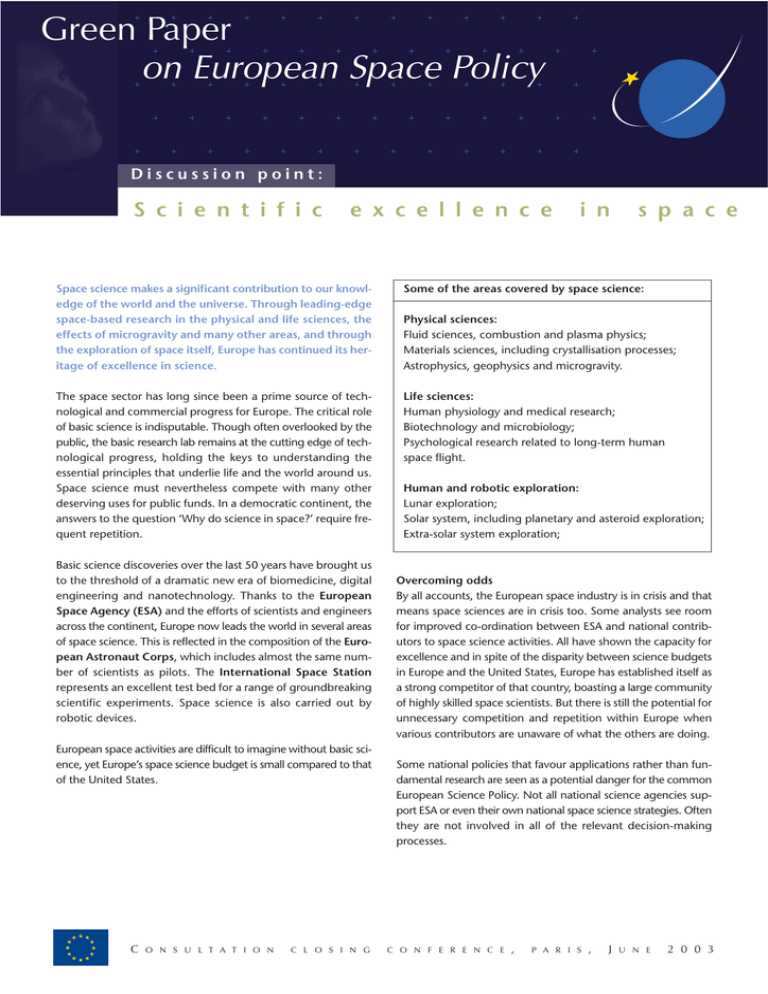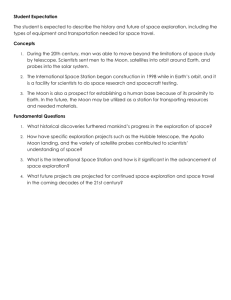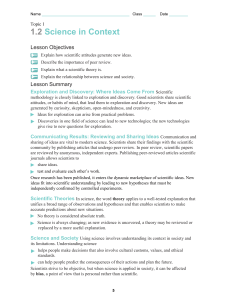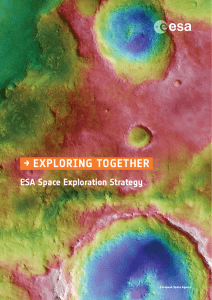Green Paper on European Space Policy
advertisement

Green Paper on European Space Policy Discussion point: S c i e n t i f i c e x c e l l e n c e i n s p a c e Space science makes a significant contribution to our knowledge of the world and the universe. Through leading-edge space-based research in the physical and life sciences, the effects of microgravity and many other areas, and through the exploration of space itself, Europe has continued its heritage of excellence in science. Some of the areas covered by space science: The space sector has long since been a prime source of technological and commercial progress for Europe. The critical role of basic science is indisputable. Though often overlooked by the public, the basic research lab remains at the cutting edge of technological progress, holding the keys to understanding the essential principles that underlie life and the world around us. Space science must nevertheless compete with many other deserving uses for public funds. In a democratic continent, the answers to the question ‘Why do science in space?’ require frequent repetition. Life sciences: Human physiology and medical research; Biotechnology and microbiology; Psychological research related to long-term human space flight. Basic science discoveries over the last 50 years have brought us to the threshold of a dramatic new era of biomedicine, digital engineering and nanotechnology. Thanks to the European Space Agency (ESA) and the efforts of scientists and engineers across the continent, Europe now leads the world in several areas of space science. This is reflected in the composition of the European Astronaut Corps, which includes almost the same number of scientists as pilots. The International Space Station represents an excellent test bed for a range of groundbreaking scientific experiments. Space science is also carried out by robotic devices. European space activities are difficult to imagine without basic science, yet Europe’s space science budget is small compared to that of the United States. C European O N S U L T A T I O N C L O S I N G Physical sciences: Fluid sciences, combustion and plasma physics; Materials sciences, including crystallisation processes; Astrophysics, geophysics and microgravity. Human and robotic exploration: Lunar exploration; Solar system, including planetary and asteroid exploration; Extra-solar system exploration; Overcoming odds By all accounts, the European space industry is in crisis and that means space sciences are in crisis too. Some analysts see room for improved co-ordination between ESA and national contributors to space science activities. All have shown the capacity for excellence and in spite of the disparity between science budgets in Europe and the United States, Europe has established itself as a strong competitor of that country, boasting a large community of highly skilled space scientists. But there is still the potential for unnecessary competition and repetition within Europe when various contributors are unaware of what the others are doing. Some national policies that favour applications rather than fundamental research are seen as a potential danger for the common European Science Policy. Not all national science agencies support ESA or even their own national space science strategies. Often they are not involved in all of the relevant decision-making processes. C O N F E R E N C E , P A R I S , J U N E 2 0 0 3 Waning interest Of critical importance to the future of space science is the ageing of Europe’s space scientific population. The numbers of skilled instrumentalists, for example, key players in the development of new technologies, is on the decline, with many from among the younger generation choosing to go to the United States where budgets are much larger and the government is clearly committed to a future in space. This ‘brain drain’ is being accompanied by a more general waning of interest in space and science among ordinary citizens. While European universities remain among the best in the world, their students are showing less and less interest in the space sector, which many now see as a dead end. Rediscovering a bold vision for space and science More recently, the European space community has recognised the need for a new, bold vision, something that would bring back the sense of excitement and adventure that once characterised space endeavours. This could involve an ambitious human mission, the Aurora project, for example, aimed at putting a European on Mars. Such a mission would add greatly to the allure of a career in space science while also ensuring the kind of longerterm financial commitment that will keep Europe’s best and brightest at home. Science must inspire again Speaking at the Green Paper consultation in Madrid, GMV ’s Luis Mayo said, “We are the children of the Apollo programme. Many of us who sit here today will have been inspired as young people when we watched the American astronauts on their magnificent mission to the moon. But where is that sense of excitement today? Most of our generation will be retired soon and we will be followed by a generation who see space as a high-risk sector offering low job security and no real excitement. What we need is to reintroduce the sense of romance and discovery that brought many of us to dedicate our lives to the space adventure.” C European O N S U L T A T I O N C L O S I N G Meanwhile, the International Space Station is already providing a high-profile platform both for state-of-the-art science and for spotlighting the exciting and inspirational aspects of human space flight. Space science missions and their results capture the human imagination more vividly than any other branch of the sciences, undoubtedly engendering a more widespread and general interest in science among the public. Space-based astronomy, astrophysics and exploration contribute powerfully to an emergent picture of our past, present and future in an evolving universe. Science as a stimulant to industry Expenditure on space science should not be seen as a financial penalty but as an investment in the future of Europe's high-tech industries. Benefits of space science and technology go far beyond the aerospace industry. For example, the development of novel X-ray telescopes has led to better spectacles for humans on the ground and X-ray focusing devices for the manufacture of microchips. Fundamental Principles of the Green Paper Making the Union the most advanced knowledge-based society in the world, a goal first put forward at the Lisbon Council of 2000, is also a guiding principle of the Space Green Paper. Science and space science clearly have an essential role to play in attaining this goal. As Europe moves toward a Common European Space Policy, space scientists are asking fundamental questions about the future of their sector. What shall the role of science be in the new Space Policy? How important is co-operation with the US and Russia? What roles will the Commission and ESA play? All agree that space science is real science, a rich source of technical innovation and potential commercial applications, and it must remain an important if not primary element in Europe’s future in space. C O N F E R E N C E , P A R I S , J U N E 2 0 0 3





